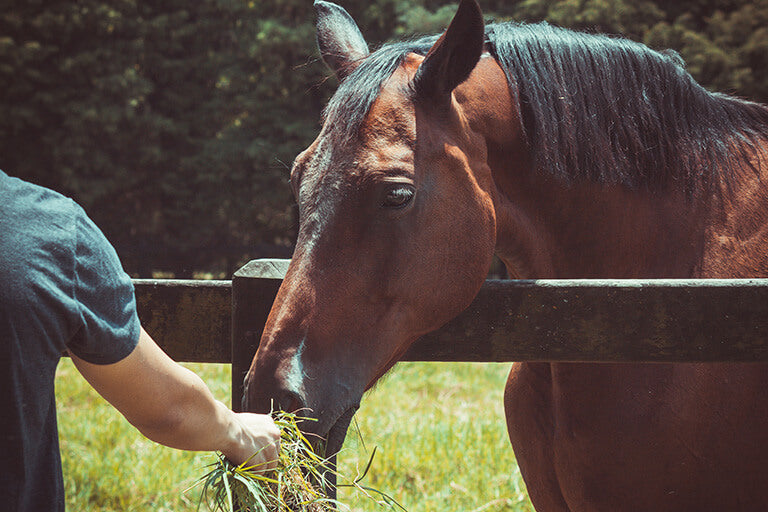We have the lowest delivery fees

How Does a Horse Eat Hay?
When it comes to feeding your horses, it is crucial to keep in mind their dietary needs and provide them with good nutrition for optimal body condition and proper horse care. Not all horses need grain feed, as they can easily get enough nutrients and energy from hay or pasture. Hay should be the primary source of calories for your horses, with grain feed added only if grass or legume hay is not enough. Why is that? Well, because equine digestive systems are designed to absorb the nutrients in the hay more effectively than from other sources. How does a horse eat hay? Keep reading to find out.

The Basics of Horse Nutrition
Horses are herbivores, so they always need to eat good quality vegetation rich in fiber. Grasses have the most equine nutrition required for optimal health, so they take up the majority of their feed intake. Typically, horses would graze in the pasture, but this is not always possible. If your horses spend too much time in the stalls, you can imitate their regular feeding regimen by placing hay where they can reach it at any time during the day. This way, horses can eat small amounts of hay throughout the day and come back to it whenever their digestive systems need it.
How Often Should a Horse Eat Hay?
Horses have excellent internal clocks and nutrition management, so they always know when they have to eat, even better than their owners. If you feed your horses several meals a day, make sure that they always arrive at the same time. Alternatively, just leave hay within reach of horses so they can eat it whenever they want. For most horses, changes in the feeding schedule will not cause a problem. Still, it is a good idea to stick to the same schedule if your horses are prone to colic because a change in schedule might trigger an episode.
If you leave long periods between feeding times, your horses might become anxious. Keep in mind, though, that when horses are in a herd, they will feed depending on the ranking of animals. So if you do not provide enough feed for all of the animals, lower-ranking horses might not get enough. That is also why you should consider giving horses constant access to hay so that all animals get a chance to feed when they need it. Spread the amount of hay equally or feed horses separately if there is such a problem.

What Does a Horse Eat Besides Hay?
Horses tend to eat often but in small portions. Here is what their diets can consist of:
- For many years, horses have eaten grass as their primary food. Because they knew that it provides the nutrition they need, they ate little at a time but very often throughout the day. Thus, make sure that your horses have access to pasture during the warmer months, but remove any harmful plants.
- Hay is a good option for when forage from the pasture is not available. It helps keep their digestive systems working healthily and also supports horses’ nutritional needs and body weight. There are varieties of grass and legume hay, both providing different benefits for the health of your animals.
- Even though horses prefer grass, in the times when only hay is available, for example, the feed can get quite dry. Adding vegetables and fruit can help solve this. For instance, horses love carrots, so this is an excellent option to aid in optimal body condition.
- For some types of horses, you might also add corn, oat, or barley concentrates to their diet. This is relevant for horses who have significant energy requirements, such as competitive horses, pregnant, or growing horses.
Horses’ Eating Habits
Horse owners know that each horse has its own eating habits. Some horses are very relaxed when eating, in which case feeding goes smoothly, while others might have undesirable eating habits. Here are some examples:
- Gobbling. Some horses gobble their feed either because it is a part of their character or because they are afraid other horses will eat it instead. When this happens, the animals do not chew their feed properly, which might lead to digestive issues like colic.
- Picky. Some horses are picky eaters. This can happen simply because horses do not like the feed you are giving them. Or, perhaps, the feed is spoiled, low in quality, or different from what the horses received before.
- Messy. There are also those horses that make a big mess when eating. In this case, they might have dental issues or simply do not find the feed tasty. Or, they might feel restless for some reason and end up throwing feed around.

You should feed horses often throughout the day but little at a time. If you keep horses always at the stable, then make sure that they have at least three meals a day, not leaving them for longer than eight hours without any feed. A good option would be to leave hay somewhere where your horses will have constant access to it and can feed at any time. Keep an eye on your horses’ diets and see what works best. If horses are underweight or overweight, they might be at risk for certain health conditions.
Purchasing Hay for Delivery
To make sure that your horses get the best high-quality hay, always check it upon delivery. If there is dust or mold in the hay, it can be harmful to your animals. Check the color of hay, moisture, any trash, and weeds in it. Conway Feed works with local Arizona farmers to provide the best quality of hay to our customers. Hay is stored indoors at optimal conditions to prevent spoilage. We deliver our hay bales across all of the United States at low fees across Arizona.


Leave a comment